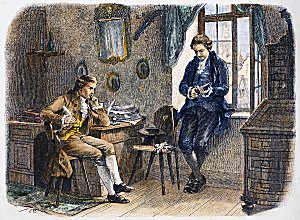The Sorrows of Young Werther (15) by J.W. von Goethe

The Sorrows of Young Werther (15)
by J.W. von Goethe
JULY 1.
The consolation Charlotte can bring to an invalid I experience from my own heart, which suffers more from her absence than many a poor creature lingering on a bed of sickness. She is gone to spend a few days in the town with a very worthy woman, who is given over by the physicians, and wishes to have Charlotte near her in her last moments. I accompanied her last week on a visit to the Vicar of S–, a small village in the mountains, about a league hence. We arrived about four o’clock: Charlotte had taken her little sister with her. When we entered the vicarage court, we found the good old man sitting on a bench before the door, under the shade of two large walnut-trees. At the sight of Charlotte he seemed to gain new life, rose, forgot his stick, and ventured to walk toward her. She ran to him, and made him sit down again; then, placing herself by his side, she gave him a number of messages from her father, and then caught up his youngest child, a dirty, ugly little thing, the joy of his old age, and kissed it. I wish you could have witnessed her attention to this old man,–how she raised her voice on account of his deafness; how she told him of healthy young people, who had been carried off when it was least expected; praised the virtues of Carlsbad, and commended his determination to spend the ensuing summer there; and assured him that he looked better and stronger than he did when she saw him last. I, in the meantime, paid attention to his good lady. The old man seemed quite in spirits; and as I could not help admiring the beauty of the walnut-trees, which formed such an agreeable shade over our heads, he began, though with some little difficulty, to tell us their history. “As to the oldest,” said he, “we do not know who planted it,–some say one clergyman, and some another: but the younger one, there behind us, is exactly the age of my wife, fifty years old next October; her father planted it in the morning, and in the evening she came into the world. My wife’s father was my predecessor here, and I cannot tell you how fond he was of that tree; and it is fully as dear to me. Under the shade of that very tree, upon a log of wood, my wife was seated knitting, when I, a poor student, came into this court for the first time, just seven and twenty years ago.”
Charlotte inquired for his daughter. He said she was gone with Herr Schmidt to the meadows, and was with the haymakers. The old man then resumed his story, and told us how his predecessor had taken a fancy to him, as had his daughter likewise; and how he had become first his curate, and subsequently his successor. He had scarcely finished his story when his daughter returned through the garden, accompanied by the above-mentioned Herr Schmidt. She welcomed Charlotte affectionately, and I confess I was much taken with her appearance. She was a lively-looking, good-humoured brunette, quite competent to amuse one for a short time in the country. Her lover (for such Herr Schmidt evidently appeared to be) was a polite, reserved personage, and would not join our conversation, notwithstanding all Charlotte’s endeavours to draw him out. I was much annoyed at observing, by his countenance, that his silence did not arise from want of talent, but from caprice and ill-humour. This subsequently became very evident, when we set out to take a walk, and Frederica joining Charlotte, with whom I was talking, the worthy gentleman’s face, which was naturally rather sombre, became so dark and angry that Charlotte was obliged to touch my arm, and remind me that I was talking too much to Frederica. Nothing distresses me more than to see men torment each other; particularly when in the flower of their age, in the very season of pleasure, they waste their few short days of sunshine in quarrels and disputes, and only perceive their error when it is too late to repair it. This thought dwelt upon my mind; and in the evening, when we returned to the vicar’s, and were sitting round the table with our bread end milk, the conversation turned on the joys and sorrows of the world, I could not resist the temptation to inveigh bitterly against ill-humour. “We are apt,” said I, “to complain, but–with very little cause, that our happy days are few, and our evil days many. If our hearts were always disposed to receive the benefits Heaven sends us, we should acquire strength to support evil when it comes.” “But,” observed the vicar’s wife, “we cannot always command our tempers, so much depends upon the constitution: when the body suffers, the mind is ill at ease.” “I acknowledge that,” I continued; “but we must consider such a disposition in the light of a disease, and inquire whether there is no remedy for it.”
“I should be glad to hear one,” said Charlotte: “at least, I think very much depends upon ourselves; I know it is so with me. When anything annoys me, and disturbs my temper, I hasten into the garden, hum a couple of country dances, and it is all right with me directly.” “That is what I meant,” I replied; “ill-humour resembles indolence: it is natural to us; but if once we have courage to exert ourselves, we find our work run fresh from our hands, and we experience in the activity from which we shrank a real enjoyment.” Frederica listened very attentively: and the young man objected, that we were not masters of ourselves, and still less so of our feelings. “The question is about a disagreeable feeling,” I added, “from which every one would willingly escape, but none know their own power without trial. Invalids are glad to consult physicians, and submit to the most scrupulous regimen, the most nauseous medicines, in order to recover their health.” I observed that the good old man inclined his head, and exerted himself to hear our discourse; so I raised my voice, and addressed myself directly to him. “We preach against a great many crimes,” I observed, “but I never remember a sermon delivered against ill-humour.” “That may do very well for your town clergymen,” said he: “country people are never ill-humoured; though, indeed, it might be useful, occasionally, to my wife for instance, and the judge.” We all laughed, as did he likewise very cordially, till he fell into a fit of coughing, which interrupted our conversation for a time. Herr Schmidt resumed the subject. “You call ill humour a crime,” he remarked, “but I think you use too strong a term.” “Not at all,” I replied, “if that deserves the name which is so pernicious to ourselves and our neighbours. Is it not enough that we want the power to make one another happy, must we deprive each other of the pleasure which we can all make for ourselves? Show me the man who has the courage to hide his ill-humour, who bears the whole burden himself, without disturbing the peace of those around him. No: ill-humour arises from an inward consciousness of our own want of merit, from a discontent which ever accompanies that envy which foolish vanity engenders. We see people happy, whom we have not made so, and cannot endure the sight.” Charlotte looked at me with a smile; she observed the emotion with which I spoke: and a tear in the eyes of Frederica stimulated me to proceed. “Woe unto those,” I said, “who use their power over a human heart to destroy the simple pleasures it would naturally enjoy! All the favours, all the attentions, in the world cannot compensate for the loss of that happiness which a cruel tyranny has destroyed.” My heart was full as I spoke. A recollection of many things which had happened pressed upon my mind, and filled my eyes with tears.
“We should daily repeat to ourselves,” I exclaimed, “that we should not interfere with our friends, unless to leave them in possession of their own joys, and increase their happiness by sharing it with them! But when their souls are tormented by a violent passion, or their hearts rent with grief, is it in your power to afford them the slightest consolation?
“And when the last fatal malady seizes the being whose untimely grave you have prepared, when she lies languid and exhausted before you, her dim eyes raised to heaven, and the damp of death upon her pallid brow, there you stand at her bedside like a condemned criminal, with the bitter feeling that your whole fortune could not save her; and the agonising thought wrings you, that all your efforts are powerless to impart even a moment’s strength to the departing soul, or quicken her with a transitory consolation.”
At these words the remembrance of a similar scene at which I had been once present fell with full force upon my heart. I buried my face in my handkerchief, and hastened from the room, and was only recalled to my recollection by Charlotte’s voice, who reminded me that it was time to return home. With what tenderness she chid me on the way for the too eager interest I took in everything! She declared it would do me injury, and that I ought to spare myself. Yes, my angel! I will do so for your sake.
The Sorrows of Young Werther (Die Leiden des jungen Werther) by J.W. von Goethe. Translated by R.D. Boylan.
To be continued

fleursdumal.nl magazine
More in: -Die Leiden des jungen Werther, Goethe, Johann Wolfgang von

